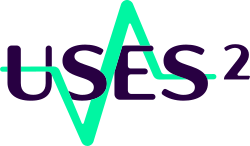International projects
As a result of the necessary replacement of fossil fuels by renewable energy, most of the energy distribution will become critically dependent upon the electricity network. This proposal aims at extending the modelling capabilities of how ultrasound guided waves propagate in, and then can probe the health state of Aluminium Conductor Steel-Reinforced (ACSR) cables, which are widely used to transfer electricity in overhead high power lines. Indeed, while the support of modelling is essential to properly design a non-destructive testing strategy, the state-of-the-art method for 7-wire strands – based on a Finite Elements representation of the cross-section – is too costly to be satisfactorily applied to the more complex geometry of an ACSR cable. Here we propose to develop a model reduction approach consisting in representing each wire as a beam, coupled to its neighbours with springs representing the contacts. We also propose to interrogate the validity of the model hypotheses with novel experimental data, by searching for tension-dependent wave phenomena which for 7-wire strands are known to inform about inter-wire contacts. The end goal is to serve the development of electricity network management based on structural integrity data.
| Coordinator | Pierric Mora |
USES of novel UltraSonic and Seismic Embedded Sensors for the non-destructive evaluation and structural health monitoring of infrastructure and human-built objects (2023 - 2027)
The Horizon European Project “USES of novel UltraSonic and Seismic Embedded Sensors for the non-destructive evaluation and structural health monitoring of infrastructure and human-built objects” (USES²) is granted for 4 years and starting March 1st 2023 (HORIZON – MSCA - 2021 – DN Project n° 101072599). The aims of USES², a MARIE SKŁODOWSKA-CURIE ACTIONS Doctoral Network, is to train a new generation of European scientists with skills across sensing and signal processing to develop and combine novel emerging sensing technologies (optical fibre and wireless pieozoelectric sensors), advanced processing (compressed sensing, artificial intelligence) and full-mechanical-waveform-based imaging.
USES² includes Scientific Research in 7 First-Class Academic Organisms (Université Gustave Eiffel/ France, Universidad Politécnica de Madrid/ Spain, CEA/France, IZFP/Germany, University of Bristol/United Kingdom (founded by UKRI), BAM/Germany, Université Libre de Bruxelles/Belgium) and 3 Industrials Companies (Isamgeo/Italy, Airbus/Spain, Zensor/Belgium) who will recruit 11 Doctoral Candidates and 12 Associated Partners (ENI/Italy, Vallen Systeme GmbH/Germany, Temai Ingenieros S.L./Spain, EDF/France, IMMS/Germany, Faber Industrie SPA/Italy, Inductosense Ltd/United Kingdom, ENSAM/France, TUIL/Germany, RWTH AACHEN/Germany, UNIPD/Italy, VUB/Belgium).
More information on the web site of the project
| Coordinator | Odile Abraham |
| Project Manager | Fatima Fenich uses2@univ-eiffel.fr |
Infrastar Training School (started in 2020)
As part of the European project INFRASTAR (Innovative and Networking for Fatigue and Reliability Analysis of Structures – Training for Assessment of Risk), coordinated by Ifsttar, a training week will be held in Bouguenais from April 8 to 12, 2019. This training will continue to be organized annually on a permanent basis after the end of the project.
The program will be widely open to external participants, including PhD students, early-career researchers, and professionals. It will feature lectures and practical activities designed to foster exchanges and interactions.
The objective of the training is to provide key knowledge on the management of civil engineering infrastructures, with a focus on material fatigue, particularly in concrete structures such as bridges and wind turbine foundations.
The lectures and practical sessions will cover:
- Advanced modeling of concrete fatigue behavior.
- The development of new non-destructive evaluation methods for the early detection and monitoring of damage.
- Probabilistic approaches for risk assessment and maintenance of fatigue-exposed structures.
The organizing committee includes Ifsttar and the doctoral schools SPI and MathSTIC in Nantes. The scientific committee consists of members from the following institutions: Ifsttar, BAM, EPFL, Wroclaw University of Science and Technology, DTU, and AAU.
The primary objective of TU1208 is to exchange and expand knowledge on geophysical or structural radar techniques (Ground Penetrating Radar – GPR) in civil engineering, taking into account technological, methodological, and data processing aspects.
This COST action focuses on the exchange of scientific and technical knowledge related to GPR techniques applied to civil engineering challenges. The initiative aims to establish and strengthen active links between universities, research institutes, and industry stakeholders working in the field of GPR, fostering and accelerating its long-term development in Europe. Around 150 institutions from 28 COST member countries have joined the action.
The project is structured around four key areas:
- Radar instrumentation,
- Civil engineering applications,
- Radar signal modeling, processing, and inversion,
- Complementary non-destructive testing techniques in civil engineering.
The contributions and outputs have been substantial: 16 training sessions, 38 short-term scientific missions, 2 books, 4 guidelines, 1 catalog, 125 peer-reviewed journal articles, and 472 presentations at international conferences.
The action led to the creation of an association (TU1208 GPR Association, gpradar.eu/tu1208) and a scientific journal (Ground Penetrating Radar – ISSN: 2533-3100). IFSTTAR was actively involved in this initiative through the participation of three researchers, including X. Dérobert, who co-led Working Group 2 of the COST action and contributed to the writing of three technical guidelines on the detection of underground networks in urban areas, the assessment of flexible pavement structures, and the evaluation of concrete structures.
